
NFTs (non-fungible tokens) are digital assets that people buy, sell, and trade. Lots of people have lost money on NFTs, while some lucky individuals have made decent money from them.
Anytime you gain or lose money, there are tax implications. This article will look at the connection between NFTs and taxes so you can be sure you’re doing everything appropriately.
What Are NFTs?
NFTs are digital assets that have been verified using blockchain technology. NFTs can be GIFs, MP4s, JPEGs, and other types of files. Every NFT has its own ID and transaction history that shows who made it, who minted it, and who has owned it.
NFTs started to become popular in 2021 as a way for creators to get money for their work. They quickly become a new type of asset for investments. In the same year, artist Beeple made an NFT artwork that sold for an impressive $69 million.
To make things even more clear, NFTs are digital certifications that show someone owns something. They are often composed of the following:
- Collectibles like limited-edition toys, sports memorabilia, and trading cards
- Digital art, such as photographs, paintings, drawings, and other visual media
- Domain names
- Gaming NFTs, including in-game characters
- Music
- Virtual real estate located in a virtual world
While NFTs peaked a few years ago, some people are still buying, selling, and creating NFTs. While most NFTs are sold for under $500, some by well-known artists have retained value or gone up in price.
When Should I Report NFTs on My Tax Return?
The IRS has noted that NFTs are considered digital assets, similar to cryptocurrency. Since this has been made clear, you need to answer “yes” on the digital assets question of Form 1040 if you do any of the following during the tax year:
- Buy an NFT
- Gift an NFT
- Receive a gifted or rewarded NFT
- Sell an NFT
- Trade an NFT for a different NFT
NFTs Are Considered Collectibles
If you buy or sell NFTs, you also need to be aware that the IRS considers them collectibles. Here’s why you need to be aware of that:
The tax code levies the sales of collectibles held for a year or more to a capital gains rate that maxes out at 28%, whereas for other assets, the maximum is only 20%.
The amount paid by an IRA (individual retirement account), or an individually directed stock bonus, profit-sharing plan, or pension to gain a collectible qualifies as a taxable distribution to yourself by the plan. This makes it subject to normal income taxes and any early withdrawal penalties.
Collectibles include the following items:
- Alcoholic beverages
- Metals or gems
- Rugs or antiques
- Stamps or coins
- Works of art
However, the IRS is allowed to name other forms of personal property collectibles.
How NFTs are Treated by Taxes
For tax purposes, things like cryptocurrency and NFTs are treated as property, similar to corporate stock or gold. When you exchange an NFT for US dollars, cryptocurrency, other property, or another NFT, you recognize taxable loss or gain.
Since NFTs are assets, they act as the same for the person who purchases them. When you sell the NFT to someone else, there are capital losses or gains. If you keep the NFT for a year or longer, the gains are taxed at more favorable rates. Losses and gains from NFTs kept for less than a year are at typical income rates.
People who purchase NFTs can deduct capital losses from selling them against other gains throughout the year. Capital losses can also be deducted at up to $3,000 from ordinary income, such as employee wages or business income. If losses are higher than $3,000, the amount carries forward to future years.
For creators of NFTs, they are considered non-capital assets. Creators receive traditional income when the NFT is sold.
What to Know When Purchasing NFTs
If you purchase NFTs with dollars (real money), there is no impact on you as a buyer, except for retirement plan and IRA buyers. However, most NFTs are not bought this way. Instead, they are sold on trading platforms using Ethereum (ETH) cryptocurrency. Making a purchase requires you to make a wallet and convert US dollars to ETH.
Creating your wallet and purchasing ETH is not taxable, either. However, when you purchase an NFT with ETH, there are two transactions for taxes. The first is selling ETH for currency and the second is exchanging that for the NFT. This will result in a capital loss or gain. This is based on the market value of ETH when you make the purchase.
How Taxes Apply to NFT Creators
Making an NFT, also called tokenizing or minting, isn’t taxable. When you sell an NFT that you made, you recognize ordinary income.
However, if you sell NFTs as a business activity, you will need to pay self-employment taxes on this income. You can deduct any relevant business expenses.
On the other hand, if you create NFTs as a hobby, there is no self-employment tax to worry about. However, you also will not get any deductions for the practice.
Capital Gains Rate
When holding an NFT for less than a year, you’re taxed on short-term capital gains rates, which range from 10 to 37% depending on your income. If the NFT is kept longer, it is taxed on long-term capital gains rates. For most, this makes them 15%, but this can go as high as 20% for those with higher income.
The highest maximum capital gains rate for NFT collectibles is 28%, which is higher than average.
Final Thoughts
NFTs are digital certificates offering ownership of physical or digital assets, such as music, videos, artwork, and collectibles. The IRS classifies NFTs as digital assets. This requires you to check “yes” on the first page of Form 1040 when asked if you sold, bought, or acquired NFTs throughout the year.
If you have additional questions about NFTs, taxes, or both, your best source of answers is a tax professional who is well-versed in these topics. You can contact Jones CPA Group LLC to have your questions answered and access a free consultation.






